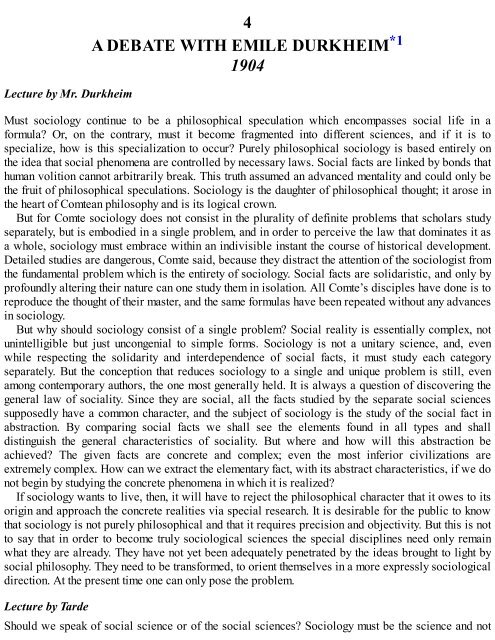3658925934
Create successful ePaper yourself
Turn your PDF publications into a flip-book with our unique Google optimized e-Paper software.
Lecture by Mr. Durkheim<br />
4<br />
A DEBATE WITH EMILE DURKHEIM *1<br />
1904<br />
Must sociology continue to be a philosophical speculation which encompasses social life in a<br />
formula? Or, on the contrary, must it become fragmented into different sciences, and if it is to<br />
specialize, how is this specialization to occur? Purely philosophical sociology is based entirely on<br />
the idea that social phenomena are controlled by necessary laws. Social facts are linked by bonds that<br />
human volition cannot arbitrarily break. This truth assumed an advanced mentality and could only be<br />
the fruit of philosophical speculations. Sociology is the daughter of philosophical thought; it arose in<br />
the heart of Comtean philosophy and is its logical crown.<br />
But for Comte sociology does not consist in the plurality of definite problems that scholars study<br />
separately, but is embodied in a single problem, and in order to perceive the law that dominates it as<br />
a whole, sociology must embrace within an indivisible instant the course of historical development.<br />
Detailed studies are dangerous, Comte said, because they distract the attention of the sociologist from<br />
the fundamental problem which is the entirety of sociology. Social facts are solidaristic, and only by<br />
profoundly altering their nature can one study them in isolation. All Comte’s disciples have done is to<br />
reproduce the thought of their master, and the same formulas have been repeated without any advances<br />
in sociology.<br />
But why should sociology consist of a single problem? Social reality is essentially complex, not<br />
unintelligible but just uncongenial to simple forms. Sociology is not a unitary science, and, even<br />
while respecting the solidarity and interdependence of social facts, it must study each category<br />
separately. But the conception that reduces sociology to a single and unique problem is still, even<br />
among contemporary authors, the one most generally held. It is always a question of discovering the<br />
general law of sociality. Since they are social, all the facts studied by the separate social sciences<br />
supposedly have a common character, and the subject of sociology is the study of the social fact in<br />
abstraction. By comparing social facts we shall see the elements found in all types and shall<br />
distinguish the general characteristics of sociality. But where and how will this abstraction be<br />
achieved? The given facts are concrete and complex; even the most inferior civilizations are<br />
extremely complex. How can we extract the elementary fact, with its abstract characteristics, if we do<br />
not begin by studying the concrete phenomena in which it is realized?<br />
If sociology wants to live, then, it will have to reject the philosophical character that it owes to its<br />
origin and approach the concrete realities via special research. It is desirable for the public to know<br />
that sociology is not purely philosophical and that it requires precision and objectivity. But this is not<br />
to say that in order to become truly sociological sciences the special disciplines need only remain<br />
what they are already. They have not yet been adequately penetrated by the ideas brought to light by<br />
social philosophy. They need to be transformed, to orient themselves in a more expressly sociological<br />
direction. At the present time one can only pose the problem.<br />
Lecture by Tarde<br />
Should we speak of social science or of the social sciences? Sociology must be the science and not









![Genki - An Integrated Course in Elementary Japanese II [Second Edition] (2011), WITH PDF BOOKMARKS!](https://img.yumpu.com/58322134/1/180x260/genki-an-integrated-course-in-elementary-japanese-ii-second-edition-2011-with-pdf-bookmarks.jpg?quality=85)
![Genki - An Integrated Course in Elementary Japanese I [Second Edition] (2011), WITH PDF BOOKMARKS!](https://img.yumpu.com/58322120/1/182x260/genki-an-integrated-course-in-elementary-japanese-i-second-edition-2011-with-pdf-bookmarks.jpg?quality=85)





